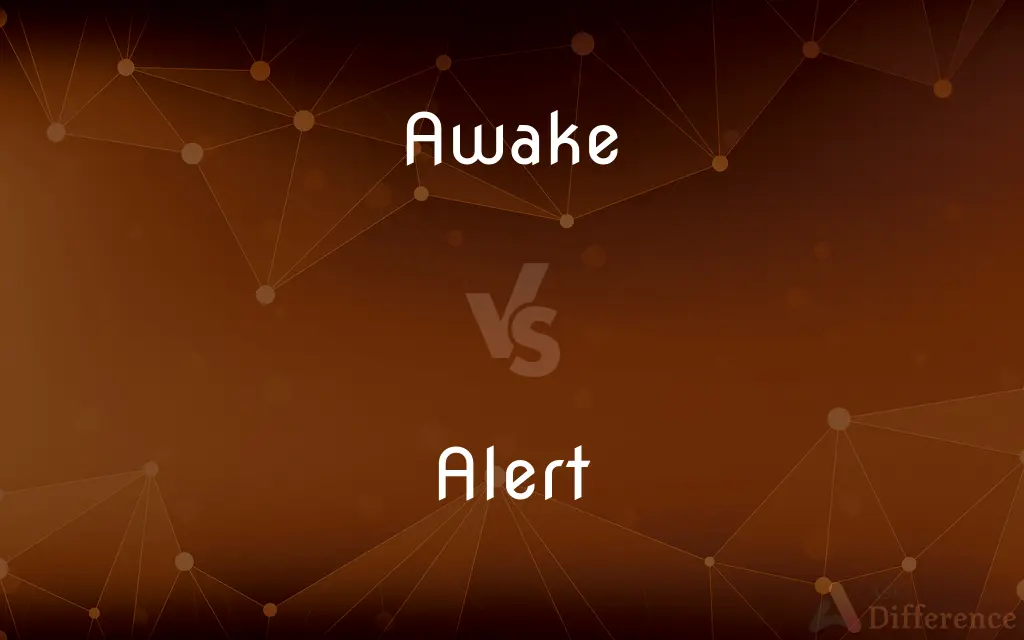Awake vs. Alert — What's the Difference?
Edited by Tayyaba Rehman — By Fiza Rafique — Updated on April 28, 2024
Being "awake" refers to the state of not being asleep, simply conscious and aware, whereas being "alert" implies a heightened state of active attention and readiness to respond.

Difference Between Awake and Alert
Table of Contents
ADVERTISEMENT
Key Differences
"Awake" denotes the basic state of consciousness where one is not sleeping. It is the broad condition of being aware of and responsive to one’s surroundings. On the other hand, "alert" signifies a more active state, where one is paying close attention to the environment, often in anticipation of changes or events.
While being awake is a prerequisite for being alert, the latter encompasses an additional layer of vigilance and readiness. For instance, one may be awake but in a relaxed, non-focused state, whereas being alert means actively processing and reacting to stimuli.
In many professional and everyday contexts, such as driving or operating machinery, merely being awake is not sufficient; one must also be alert. This means actively observing, interpreting, and ready to react swiftly to situations that might arise.
Being alert is associated with higher levels of brain activity than just being awake. This includes engagement of the sensory processing areas of the brain, which are critical for quick decision-making and response.
The transition from simply being awake to being alert can be influenced by various factors, including external stimuli, emotional states, and the ingestion of stimulants like caffeine, which enhances alertness but does not affect the state of being awake directly.
ADVERTISEMENT
Comparison Chart
Definition
The state of not sleeping; conscious.
A heightened state of vigilance and readiness.
Focus Level
General awareness of surroundings.
High attention to detail and potential changes.
Required For
All conscious activities.
Activities requiring quick or immediate response.
Brain Activity
Normal levels, sufficient for basic consciousness.
Elevated, particularly in sensory and response areas.
Examples
Being awake during a movie.
Being alert while driving in heavy traffic.
Compare with Definitions
Awake
Simply not sleeping; not necessarily focused.
She was awake but still lying in bed, not yet ready to get up.
Alert
Fully attentive and prepared to respond.
The guard remained alert throughout his shift.
Awake
In a state of basic awareness.
He stayed awake during the long flight but didn’t pay much attention to his surroundings.
Alert
Highly aware and quick to notice changes.
As a wildlife photographer, you need to be alert to capture the perfect shot.
Awake
Aware of one's environment in a basic sense.
Even though I was awake, I didn't notice the phone ring.
Alert
Vigilant and ready to act.
The emergency made everyone more alert to the sounds in the hallway.
Awake
The opposite of sleeping.
After the alarm rang, it took me a while to feel fully awake.
Alert
Actively engaged in observing and responding to the environment.
Staying alert while driving at night is crucial for safety.
Awake
To rouse from sleep; waken
"It was almost dark when the sound of crickets awoke her" (Jonathan Safran Foer).
Alert
Enhanced focus and readiness compared to just being awake.
Drinking coffee helps him stay alert during long meetings.
Awake
To make aware of
The report awoke him to the possibilities of a compromise.
Alert
Quick to notice any unusual and potentially dangerous or difficult circumstances; vigilant
An alert police officer discovered a lorry full of explosive
Schools need to be constantly alert to this problem
Awake
To stir up (memories, for example).
Alert
The state of being watchful for possible danger
Security forces are on the alert for an upsurge in violence
Awake
To wake up.
Alert
Warn (someone) of a danger or problem
Police were alerted after three men drove away without paying
He alerted people to the dangers of smoking
Awake
To become alert.
Alert
Vigilantly attentive; watchful
Alert to danger.
An alert bank guard.
Awake
To become aware or cognizant
"Web publishers have awaked to the idea that they need to offer not only material appealing to children, but a little supervision as well" (Laurie J. Flynn). See Usage Note at wake1.
Alert
Mentally responsive and perceptive; quick.
Awake
Completely conscious; not in a state of sleep.
Alert
Brisk or lively in action
The bird's alert hopping from branch to branch.
Awake
Fully alert; attuned.
Alert
A signal that warns of attack or danger
Sirens sounded the alert for an air raid.
Awake
Not asleep; conscious.
Alert
A condition or period of heightened watchfulness or preparation for action
Nuclear-armed bombers were put on alert during the crisis.
Awake
Alert, aware.
They were awake to the possibility of a decline in sales.
Alert
To notify of approaching danger or action; warn
A flashing red light that alerted motorists to trouble ahead.
Awake
(intransitive) To become conscious after having slept.
Alert
Attentive; awake; on guard.
Awake
(transitive) To cause (somebody) to stop sleeping.
Put to sleep
Alert
(obsolete) brisk; nimble; moving with celerity.
Awake
(transitive) To make aware of something.
Alert
An alarm.
Awake
(transitive) To excite or to stir up something latent.
Alert
A notification of higher importance than an advisory.
Awake
To rouse from a state of inaction or dormancy.
Alert
(military) A state of readiness for potential combat.
An airborne alert; ground alert
Awake
To come out of a state of inaction or dormancy.
Alert
To give warning to.
Awake
To rouse from sleep; to wake; to awaken.
Where morning's earliest ray . . . awake her.
And his disciples came to him, and awoke him, saying, Lord, save us; we perish.
Alert
Watchful; vigilant; active in vigilance.
Awake
To rouse from a state resembling sleep, as from death, stupidity., or inaction; to put into action; to give new life to; to stir up; as, to awake the dead; to awake the dormant faculties.
I was soon awaked from this disagreeable reverie.
It way awake my bounty further.
No sunny gleam awakes the trees.
Alert
Brisk; nimble; moving with celerity.
An alert young fellow.
Awake
To cease to sleep; to come out of a state of natural sleep; and, figuratively, out of a state resembling sleep, as inaction or death.
The national spirit again awoke.
Awake to righteousness, and sin not.
Alert
An alarm from a real or threatened attack; a sudden attack; also, a bugle sound to give warning.
Awake
Not sleeping or lethargic; roused from sleep; in a state of vigilance or action.
Before whom awake I stood.
She still beheld,Now wide awake, the vision of her sleep.
He was awake to the danger.
Alert
Condition of heightened watchfulness or preparation for action;
Bombers were put on alert during the crisis
Awake
Stop sleeping;
She woke up to the sound of the alarm clock
Alert
A warning serves to make you more alert to danger
Awake
Not in a state of sleep; completely conscious;
Lay awake thinking about his new job
Still not fully awake
Alert
An automatic signal (usually a sound) warning of danger
Awake
Not unconscious; especially having become conscious;
The patient is now awake and alert
Alert
Warn or arouse to a sense of danger or call to a state of preparedness;
The empty house alarmed him
We alerted the new neighbors to the high rate of burglaries
Awake
(usually followed by `to') showing acute awareness; mentally perceptive;
Alert to the problems
Alive to what is going on
Awake to the dangers of her situation
Was now awake to the reality of his predicament
Alert
Very attentive or observant;
An alert and responsive baby is a joy
Caught by a couple of alert cops
Alert enough to spot the opportunity when it came
Constantly alert and vigilant, like a sentinel on duty
Alert
Mentally responsive;
An alert mind
Alert
Not unconscious; especially having become conscious;
The patient is now awake and alert
Alert
(usually followed by `to') showing acute awareness; mentally perceptive;
Alert to the problems
Alive to what is going on
Awake to the dangers of her situation
Was now awake to the reality of his predicament
Common Curiosities
What can help a person transition from just being awake to being alert?
Stimulants like caffeine, engaging activities, or situations requiring focus can help enhance alertness.
How does being alert affect one's ability to perform tasks?
Being alert improves task performance by enhancing focus, reaction times, and the ability to make decisions quickly.
What is the basic difference between being awake and alert?
Being awake refers to the basic state of consciousness, while being alert implies a heightened state of active attention and readiness.
What are signs that someone is alert?
Signs of alertness include quick responses to questions or events, focused eyes, and active engagement with the environment.
What is the role of the nervous system in being alert?
The nervous system plays a critical role in alertness by processing sensory information and initiating responses.
What could be the consequences of low alertness in safety-critical roles?
Low alertness can lead to mistakes, slow reactions, and accidents, compromising safety.
Can someone be awake but not alert?
Yes, one can be awake without being alert, such as being awake but drowsy or unfocused.
Why is being alert important in certain jobs?
Alertness is crucial in jobs requiring quick reactions to prevent accidents or handle emergencies, such as in healthcare or law enforcement.
Is alertness a constant state when one is awake?
No, alertness can vary depending on the time of day, activities, and overall health or mood of an individual.
How can someone improve their alertness?
Regular sleep, healthy diet, physical activity, and mental exercises can improve alertness.
Can alertness be measured?
Yes, alertness can be measured using cognitive and physical response tests, among other methods.
Does alertness decrease with age?
Alertness can decrease with age due to changes in brain function and sleep patterns.
What environmental factors can affect alertness?
Noise, lighting, temperature, and the nature of tasks can impact a person's alertness.
How does alertness relate to overall health?
Good alertness levels often indicate adequate rest and health, while poor alertness may suggest health issues or sleep deprivation.
How do professionals maintain alertness during long shifts?
Breaks, shifts in tasks, interactions with colleagues, and moderate caffeine intake can help maintain alertness.
Share Your Discovery

Previous Comparison
Agenda vs. Minutes
Next Comparison
Acromegaly vs. GigantismAuthor Spotlight
Written by
Fiza RafiqueFiza Rafique is a skilled content writer at AskDifference.com, where she meticulously refines and enhances written pieces. Drawing from her vast editorial expertise, Fiza ensures clarity, accuracy, and precision in every article. Passionate about language, she continually seeks to elevate the quality of content for readers worldwide.
Edited by
Tayyaba RehmanTayyaba Rehman is a distinguished writer, currently serving as a primary contributor to askdifference.com. As a researcher in semantics and etymology, Tayyaba's passion for the complexity of languages and their distinctions has found a perfect home on the platform. Tayyaba delves into the intricacies of language, distinguishing between commonly confused words and phrases, thereby providing clarity for readers worldwide.
















































